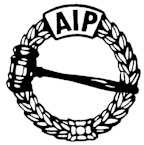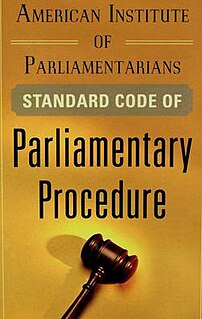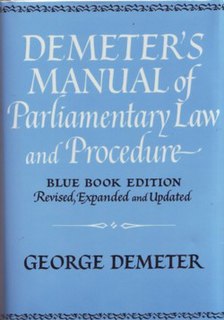
Robert's Rules of Order Newly Revised, commonly referred to as Robert's Rules of Order, RONR, or simply Robert's Rules, is a political book written by Henry Martyn Robert. It is the most widely used manual of parliamentary procedure in the United States. It governs the meetings of a diverse range of organizations—including church groups, county commissions, homeowners associations, nonprofit associations, professional societies, school boards, and trade unions—that have adopted it as their parliamentary authority.

Parliamentary procedure is the accepted rules, ethics, and customs governing meetings of an assembly or organization. It is supposed to represent the will of the majority. Its object is to allow deliberation upon questions of interest to the organization and to arrive at the sense or the will of the assembly upon these questions. Self-governing organizations follow parliamentary procedure to debate and reach group decisions—usually by vote—with the least possible friction.

Minutes, also known as minutes of meeting, protocols or, informally, notes, are the instant written record of a meeting or hearing. They typically describe the events of the meeting and may include a list of attendees, a statement of the issues considered by the participants, and related responses or decisions for the issues.

The American Institute of Parliamentarians (AIP) is a not-for-profit educational organization founded in 1958. The objectives of AIP are to promote the use and teaching of parliamentary procedure, as well as the training and certification of parliamentarians.
A parliamentary authority is a book of rules on conducting business in deliberative assemblies. A group generally creates its own rules and then adopts such a book to cover meeting procedure not covered in its rules. Different books have been used by organizations and by legislative assemblies.
In US parliamentary procedure, the previous question is generally used as a motion to end debate on a pending proposal and bring it to an immediate vote. The meaning of this specialized motion has nothing to do with any question previously considered by the assembly.

In the United States Congress, Riddick's Senate Procedure is a Senate document containing the contemporary precedents and practices of the Senate. It was named after Senate Parliamentarian Emeritus Floyd Riddick, and is updated periodically by the Senate Parliamentarian.

Floyd Millard Riddick was a Parliamentarian of the United States Senate from 1964 to 1974, and is most famous for developing Riddick's Senate procedure. He sat immediately below the presiding officer in the Senate chamber, providing information on precedents and advising other senators on parliamentary procedure. He is famous for discussions of the censures of Joseph McCarthy and Thomas Dodd, the contested election between John A. Durkin and Louis Wyman, and the preparations for a planned impeachment trial of Richard Nixon. He is also famous for advocating the change in the rules of cloture.

The Standard Code of Parliamentary Procedure is a book of rules of order. It is the second most popular parliamentary authority in the United States after Robert's Rules of Order. It was first published in 1950. Following the death of the original author in 1975, the third (1988) and fourth (2001) editions of this work were revised by a committee of the American Institute of Parliamentarians. In April 2012, a new book, entitled American Institute of Parliamentarians Standard Code of Parliamentary Procedure (AIPSC) was released.
In the United States, a parliamentarian is an expert on parliamentary procedure who advises organizations and deliberative assemblies. This sense of the term "parliamentarian" is distinct from the usage in most other countries to mean a member of parliament.
In parliamentary procedure, a suspension of the rules allows a deliberative assembly to set aside its normal rules to do something that it could not do otherwise. However, there are rules that cannot be suspended.

Demeter's Manual of Parliamentary Law and Procedure is a parliamentary authority manual by George Demeter. It is included in the bank of study materials used in preparing for the Certified Parliamentarian (CP) designation offered by the American Institute of Parliamentarians. Similar to Robert's Rules of Order, Demeter's Manual notes, "Without rules, there would be injustice and confusion. Hence, it is as necessary to follow the rules of parliamentary law as it is to follow the rules of a ball game or a card game." The book attempts to include everything a presiding officer might need to know, including public courtesies and ceremonies; sample prayers for opening a meeting; organizing a new lodge, chapter or post; times of fraction and discord; acquisition of new members; installation of officers; and adjournment. Chapter 16 contains an "entire meeting in drill form," designed to illustrate a range of parliamentary motions and situations and how a chairman would handle them. Demeter also devotes space to discussing strategic use of parliamentary procedure. The book concludes with "The Greatest Convention Ever Held", an account of the Creation in parliamentary terms.
Debate in parliamentary procedure refers to discussion on the merits of a pending question; that is, whether it should or should not be agreed to. It is also commonly referred to as "discussion".
Parliamentary procedure in the corporate world may follow traditional parliamentary authorities such as Robert's Rules of Order or simpler rules of order considered by some commentators to be more appropriate in the corporate setting.
The history of parliamentary procedure refers to the origins and evolution of parliamentary law used by deliberative assemblies.
Stopping the clock is a controversial practice in American and Canadian legislative procedure in which a legislature literally or notionally stops the clock, usually for the purpose of meeting a constitutional or statutory deadline. Riddick's Rules of Procedure notes, "The official clock is stopped by agreement of the 'powers that be' without any motion or announcement one minute before the designated hour." Sometimes it is done to allow more time for lobbying or deal-making to obtain the necessary votes for one side to prevail on a measure. Some legislatures actually stop the clock, and others simply use it as a metaphor for continuing business after a time deadline has passed. Stopping the clock is also sometimes done for ceremonial purposes to ensure that both houses of a bicameral legislature adjourn simultaneously.
In parliamentary procedure, the verb to table has the opposite meaning in different countries:

Alan Scott Frumin is a former parliamentarian of the United States Senate.
The American College of Parliamentary Lawyers (ACPL) is a professional association of lawyers from the United States and Canada.








